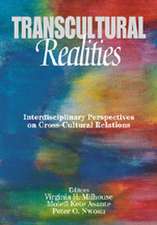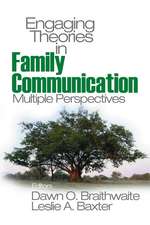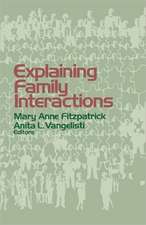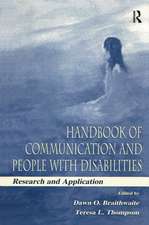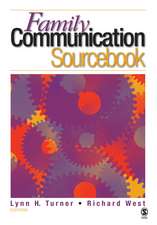Engaging Theories in Interpersonal Communication: Multiple Perspectives
Editat de Dawn O. Braithwaite, Paul Schrodten Limba Engleză Paperback – 28 oct 2021
With each chapter devoted to a specific theory and authored by experts in that theory, the book gives students and scholars a comprehensive overview of this field. This edition features an expanded discussion of theory development and evaluation, a new section on theories of identity and difference in close relationships, and increased attention to social media.With the theory chapters sharing the same structure, the book ensures consistent coverage of topics within each theory.
This book is an essential text for advanced undergraduate and graduate courses in interpersonal communication and is a valued resource for scholars.
| Toate formatele și edițiile | Preț | Express |
|---|---|---|
| Paperback (2) | 466.96 lei 6-8 săpt. | |
| Taylor & Francis – 28 oct 2021 | 466.96 lei 6-8 săpt. | |
| SAGE Publications – dec 2014 | 836.31 lei 6-8 săpt. | |
| Hardback (1) | 937.55 lei 3-5 săpt. | +30.14 lei 6-12 zile |
| Taylor & Francis – 28 oct 2021 | 937.55 lei 3-5 săpt. | +30.14 lei 6-12 zile |
Preț: 466.96 lei
Preț vechi: 549.36 lei
-15% Nou
Puncte Express: 700
Preț estimativ în valută:
89.35€ • 93.11$ • 73.98£
89.35€ • 93.11$ • 73.98£
Carte tipărită la comandă
Livrare economică 03-17 aprilie
Preluare comenzi: 021 569.72.76
Specificații
ISBN-13: 9780367425319
ISBN-10: 0367425319
Pagini: 462
Ilustrații: 5 Tables, black and white; 9 Line drawings, black and white; 9 Illustrations, black and white
Dimensiuni: 152 x 229 x 30 mm
Greutate: 0.62 kg
Ediția:3 ed
Editura: Taylor & Francis
Colecția Routledge
Locul publicării:Oxford, United Kingdom
ISBN-10: 0367425319
Pagini: 462
Ilustrații: 5 Tables, black and white; 9 Line drawings, black and white; 9 Illustrations, black and white
Dimensiuni: 152 x 229 x 30 mm
Greutate: 0.62 kg
Ediția:3 ed
Editura: Taylor & Francis
Colecția Routledge
Locul publicării:Oxford, United Kingdom
Public țintă
Postgraduate and UndergraduateCuprins
1. Introduction: Meta-Theory and Theory in Interpersonal Communication Research Part 1: Individually-Centered Theories of Interpersonal Communication 2. Affection Exchange Theory: A Bio-Evolutionary Look at Affectionate Communication 3. Attribution Theory: Finding Good Cause in the Search for Theory 4. Multiple Goals Theories: From Message Production to Evaluation 5. Problematic Integration Theory: Uncertainty and Related Communication Challenges 6. Relational Framing Theory: Drawing Inferences about Relationships from Interpersonal Interactions 7. Dual Process and Advice Response Theories: Explaining Outcomes of Supportive Communication 8. The Theory of Motivated Information Management: Struggles with Uncertainty and Its Outcomes Part 2: Discourse/Interaction-Centered Theories of Interpersonal Communication 9. Communicated Narrative Sense-Making Theory: Bridging Storytelling, Relationships, and Well-Being 10. Communication Accommodation Theory: Converging Toward an Understanding of Communication Adaptation in Interpersonal Relationships 11. Discrepant Verbal-Nonverbal Profile Theory: Making Sense of Contradicting Messages in Interpersonal Communication 12. Expectancy Violations Theory and Interaction Adaptation Theory: From Expectations to Interactions 13. Face Theory: The Ongoing Performances of Our Lives 14. Normative Rhetorical Theory: Explaining What Works in Challenging Communication Situations 15. Relational Dialectics Theory: A Dialogic Theory of Meaning-Making 16. A Theory of Transcendent Interactions: The Ultimate Communication Thrill Ride Part 3: Identity-Centered Theories of Interpersonal Communication 17. Communication Theory of Identity: Understanding the Multi-layered Nature of Identity 18. Critical Feminist Theory: Giving Voice and Visibility to Gendered Experiences 19. Critical Race Theory: Dismantling Racial Oppression Through Interpersonal Communication 20. Intersectionality: Theoretical Lineages Toward Interpersonal Legacies 21. Strong Black Woman Collective Theory: Understanding the Group-level Communication Practices of Black Women 22. Queer Theory: Troubling Interpersonal Expectations of Sex, Gender, and Sexuality Part 4: Relationship-Centered Theories of Interpersonal Communication 23. Attachment Theory: A Communication Perspective 24. Communication Privacy Management Theory: Significance for Interpersonal Communication 25. Developmental Theories of Relationships: Approaches to Understanding the Relational Lifespan 26. The Theory of Resilience and Relational Load: Investing in Relationships to Promote Resilience 27. Media Multiplexity Theory: Explaining Tie Strength and Technology Use 28. Relational Turbulence Theory: Interpersonal Communication During Times of Transition 29. Social Exchange Theories: Calculating the Rewards and Costs of Personal Relationships 30. The Theory of Interpersonal Knowledge: Interaction Requirements to Develop Dyad-Specific Familiarity 31. Truth-Default Theory: Changing Our Understanding of Human Deception
Notă biografică
Dawn O. Braithwaite (PhD, University of Minnesota) is a Willa Cather Professor of Communication, University of Nebraska-Lincoln, USA. She studies discourse-dependent families, dialectics of relating, and communication rituals in stepfamilies and voluntary kin. She has published 6 books and over 130 articles and chapters. A Distinguished Scholar of the National Communication Association and Western States Communication Associations, Braithwaite received NCA’s Bernard J. Brommel Award for Family Communication and the Becker Distinguished Service Award. She is the Past President of NCA and WSCA.
Paul Schrodt (PhD, University of Nebraska-Lincoln) is the Philip J. and Cheryl C. Burguières Professor in the Department of Communication Studies at Texas Christian University, USA. He studies communication processes that facilitate family relationships, with a particular interest in conflict and stepfamily functioning. He has authored more than 100 journal articles and book chapters, has received the National Communication Association’s Bernard J. Brommel Award for Family Communication, and served as Editor of Communication Monographs.
Paul Schrodt (PhD, University of Nebraska-Lincoln) is the Philip J. and Cheryl C. Burguières Professor in the Department of Communication Studies at Texas Christian University, USA. He studies communication processes that facilitate family relationships, with a particular interest in conflict and stepfamily functioning. He has authored more than 100 journal articles and book chapters, has received the National Communication Association’s Bernard J. Brommel Award for Family Communication, and served as Editor of Communication Monographs.
Recenzii
Accolades for the Second Edition: Winner of the Gerald Miller Book Award from the Interpersonal Communication Division of the National Communication Association
Descriere
This third edition maintains its place as a key resource for learning the foundational and emerging theories in the field of interpersonal communication. With each chapter authored by experts in a specific theory, the book offers a comprehensive overview for scholars and advanced undergraduate and graduate students.






